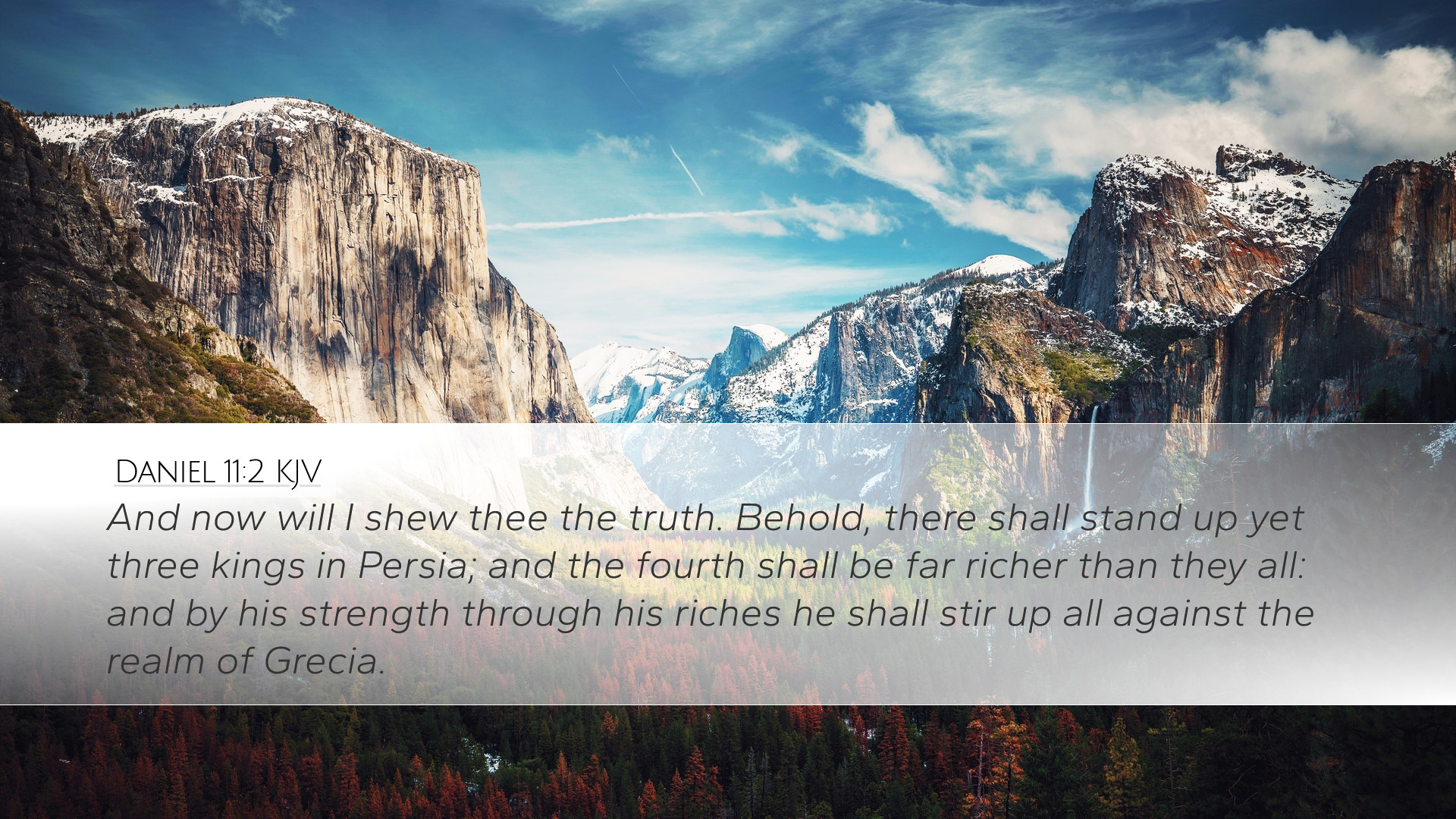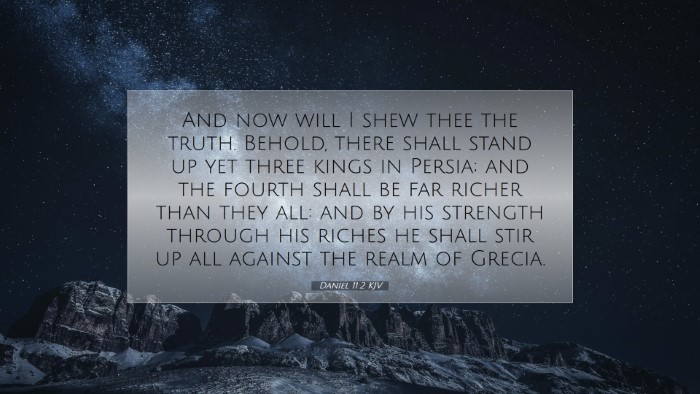Commentary on Daniel 11:2
Verse Context: The verse Daniel 11:2 states: "And now I will show you the truth. Behold, three more kings will arise in Persia, and the fourth shall be far richer than them all; by his strength, through his riches, he shall stir up all against the realm of Greece."
Overview
This passage sets the stage for a significant historical prophecy concerning the Persian Empire and its relationship with the subsequent rise of Greece. Scholars note the transition from the Babylonian dominance to the emergence of Medo-Persia and the eventual rise of the Grecian Empire, highlighting the cavalcade of power shifts in the ancient Near East. The prophetic nature of this chapter offers much for doctrinal studies and historical examination.
Historical Significance
1. The Title “The Truth”: Daniel introduces a declaration of truth, emphasizing the divine origin of the upcoming revelations. The credibility of the prophecy is grounded in the trustworthiness of God’s revelation through His messenger.
2. The Kings of Persia:
- The Three Kings: The first three kings typically recognized in this context are Cambyses, Smerdis, and Darius I.
- The Fourth King: Xerxes I, identified as the fourth king, exhibits immense wealth and power, as indicated by historical records. His reign is marked by ambition and strategic military endeavors against Greece.
3. Political Dynamics: The prophecy illustrates the political dynamics inherent within the Persian Empire and its aspirations. The reference to stirring up conflict underlines a recurrent theme of history: the interplay of wealth and warfare as agents of change.
Theological Insights
1. God’s Sovereignty: The unfolding of these events underscores God’s sovereign control over nations and rulers. Matthew Henry highlights that these prophecies serve to remind believers of God’s ultimate authority in the midst of tumultuous political landscapes.
2. Preservation of God’s People: Adam Clarke notes that this prophecy comes during a period of turbulence for the Jewish people. The mention of future conflicts serves as a promise that God remains aware of their plight, offering hope amidst despair.
3. Edification for Believers: These prophetic insights ultimately serve to fortify the faith of believers in every generation, reminding them that history is unfolding according to God’s divine plan and purpose.
Exegesis and Interpretation
In considering the nuances of Daniel 11:2, care should be taken to understand the literary and historical context of apocalyptic literature.
1. Literary Style: The apocalyptic genre often employs symbolic language and vivid imagery to evoke profound truths about divine intervention in human affairs. Daniel's prophecies weave together historical narrative with eschatological expectation.
2. Application for Today: The themes of power transitions resonate with contemporary readers, as modern nations experience similar upheavals. Pastors and theologians must engage with this text to draw parallels between biblical prophecies and current geopolitical realities.
Conclusion
In summation, Daniel 11:2 reveals critical insights regarding the succession of empires, elucidating the role of divine providence amidst human ambition. It forms a vital piece of the prophetic puzzle that encourages pastors, students, and scholars alike to contemplate the grand narrative of God's plan for humanity.
This prophetic insight into future events not only shaped the historical landscape of the Persian and Grecian empires but also continues to hold significant relevance for believers today. In understanding these scriptures, one is urged to recognize God’s enduring sovereignty and the ultimate fulfillment of His promises.
Further Study Recommendations
- Compare with Ezra and Nehemiah: Exploring the historical books of Ezra and Nehemiah may provide additional context regarding the Jewish return and restoration during persisting imperial influences.
- Examine the Entire Chapter: A comprehensive study of Daniel 11 is encouraged to grasp the complete prophetic timeline and its implications for the Jewish people.
- Engage with Scholarly Works: Consider delving into the works and commentaries of noted scholars for deeper theological insights and historical analysis.


